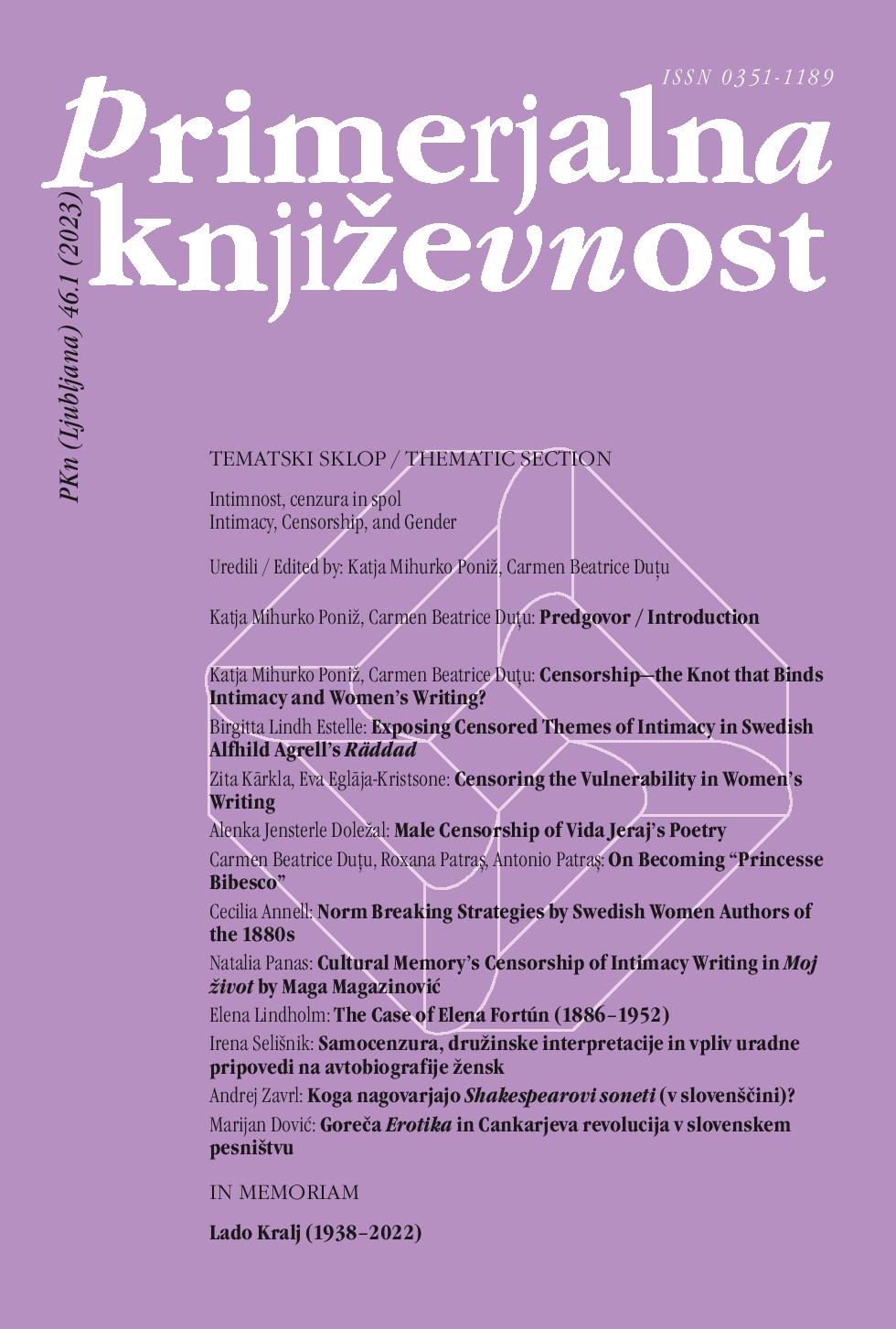The Censorship of a Closeted Spain: The Case of Elena Fortún (1886–1952)
DOI:
https://doi.org/10.3986/pkn.v46.i1.08Keywords:
Spanish literature, Spanish women writers, Fortún, Elena, sexual identity, lesbianism, Franco regime, censorshipAbstract
This article focuses on how self-censorship and state censorship have shaped the literary legacy of the Spanish author of children’s books, Elena Fortún. The homosexual closet is presented as a key concept for understanding the impact of censorship on the work of a lesbian writer such as Fortún who has contributed to various narratives of Spanish femininity over the course of almost a century. The first of these is the narrative of gender dissidence during the Second Republic (1931–1939); followed by the narrative of the wife and mother belonging to the Franco Regime (1939–1975); and finally the LGBTQ inclusiveness of the new millennium in Spain (2005–2022). The works included in the analysis are varied, spanning from Fortún’s children’s books to her correspondence and finally two posthumously published novels. This reading of Fortún’s texts reveals how censorship works as a controlling gaze that not only operates from the outside, but is also internalized in the individual, maintaining the doors of the homosexual closet closed from the inside.
References
Beniziman, Yuval. “The Difficulty of Determining Self-Censorship in Fiction Texts.” <em>Self-Censorship in Contexts of Conflict: Theory and Research</em>. Eds. Daniel Bar-Tal et al. Cham: Springer, 2017. 207–19.
Capdevila-Argüelles, Nuria. “Introducción.” <em>El pensionado de Santa Casilda</em>. Authors Elena Fortún and Matilde Ras. Seville: Renacimiento, 2022. 7–62.
Capdevila-Argüelles, Nuria. “Introducción.” <em>Oculto sendero</em>. Author Elena Fortún. Seville: Renacimiento, 2016. 7–68.
Capdevila-Argüelles, Nuria. “Introduccion.” <em>Celia madrecita</em>. Author Elena Fortun. Seville: Renacimiento, 2015. 7–38.
Capdevila-Argüelles, Nuria. “Introducción.” <em>El cuaderno de Celia</em>. Author Elena Fortún. Seville: Renacimiento, 2017. 13–20.
Capdevila-Argüelles, Nuria. “The Dissidence Inside Her Closet: Elena Fortún versus Encarnación Aragoneses Urquijo.” <em>Queer Women in Modern Spanish Literature: Activism, Sexuality, and the Otherness of the ‘Chicas Raras’</em>. Eds. Ana Isabel Simón Alegre and Lou Charnon-Deutsch. London; New York, NY: Routledge, 2022. 102–17.
Carretón Cano, Vicente. “Victorina Durán y el círculo sáfico de Madrid: semblanza de una escenografía del 27.” <em>El maquinista de la generación</em> 9 (2005): 4–20.
Consejo Superior de Mujeres de Acción Católica. <em>Catálogo crítico de libros para niños</em>. Madrid: Veritas Vincit, 1945.
Dorao, Marisol. <em>Los mil sueños de Elena Fortún</em>. Cádiz: Alboroque, 2001.
Driscoll, Catherine. <em>Girls: Feminine Adolescence in Popular Culture & Cultural Theory</em>. New York, NY: Columbia University Press, 2002.
Fortún, Elena. <em>Celia institutriz en América</em>. Seville: Renacimiento, 2015 [1944].
Fortún, Elena. <em>Celia lo que dice</em>. Seville: Renacimiento, 2020 [1929].
Fortún, Elena. <em>Celia madrecita</em>. Seville: Renacimiento, 2015 [1939].
Fortún, Elena. <em>Celia se casa</em>. Seville: Renacimiento, 2018 [1950].
Fortún, Elena. <em>El cuaderno de Celia</em>. Seville: Renacimiento, 2017 [1947].
Fortún, Elena. <em>Oculto sendero</em>. Seville: Renacimiento, 2016.
Fortún, Elena. <em>Sabes quién soy: cartas a Inés Field. Vol. 1</em>. Ed. Nuria Capdevila-Argüelles. Seville: Renacimiento, 2021.
Fortún, Elena. <em>Mujer doliente: cartas a Inés Field. Vol. 2</em>. Ed. Nuria Capdevila-Argüelles. Seville: Renacimiento, 2021.
Fortún, Elena, and Matilde Ras. <em>El pensionado de Santa Casilda</em>. Seville: Renacimiento, 2022.
Foucault, Michel. <em>Vigilar y castigar: nacimiento de la prisión</em>. Transl. Aurelio Garzón del Camino. Buenos Aires: Siglo Veintiuno, 2004.
García Padrino, Jaime. <em>Historia crítica de la literatura infantil y juvenil en la España actual (1939–2015)</em>. Madrid: Marcial Pons Historia, 2018.
Gorbea Lemmi, Eusebio de. <em>Los mil años de Elena Fortún: Magerit</em>. Madrid: Saturnino Calleja, 1922.
Leggott, Sarah. “The Female Intellectual in 1920s Madrid: Writing the Lyceum Club.” <em>Journal of the Australasian Universities Language and Literature Association</em> 110 (2008): 95–112.
Lindholm, Elena. “Celia, Elena Fortún’s Queer New Girl.” <em>Queer Women in Modern Spanish Literature: Activism, Sexuality, and the Otherness of the ‘Chicas Raras’</em>. Eds. Ana Isabel Simón Alegre and Lou Charnon-Deutsch. London; New York, NY: Routledge, 2022. 118–32.
Martín Gaite, Carmen. “Pesquisa tardía de Elena Fortún.” <em>Celia, lo que dice</em>. Author Elena Fortún. Madrid: Alianza, 1993. 7–37.
Martínez Martín, Jesús A. “Editar en tiempos de dictadura: la política del libro y las condiciones del campo editorial.” <em>Historia de la edición en España (1939–1975)</em>. Eds. Jesús A. Martínez Martín and Marcial Pons. Madrid: Ediciones de Historia, 2015. 27–42.
Mascarell, Purificació. “‘Vestirme de hombre y montar a caballo’: androginia y mujer moderna en la novela autobiográfica <em>Oculto sendero</em>, de Elena Fortún.” <em>Clepsydra: Revista de Estudios de Género y Teoría Feminista</em> 21 (2021): 17–33.
Moreno-Lago, Eva María. “Indicios y espacios literarios para la reconstrucción del círculo sáfico madrileño en las obras de Elena Fortún, Rosa Chacel y Victorina Durán.” <em>Feminismo/s</em> 37 (2021): 211–36.
Petley, Julian. <em>Censorship: A Beginner’s Guide</em>. Petley: Oneworld Publications, 2012.
Puchau de Lecea, Ana. “Girl, Interrupted and Continued: Rethinking the Influence of Elena Fortún’s Celia.” <em>Girlhood Studies</em> 10.3 (2017): 137–51.
Richmond, Kathleen. <em>Women and Spanish Fascism: The Women’s Section of the Falange, 1934–1959</em>. London; New York, NY: Routledge, 2003.
Sedgwick, Eve Kosofsky. <em>Epistemology of the Closet</em>. New York, NY: Harvester Wheatsheaf, 1991.
Thompson, Michael. “The Order of the Visible and the Sayable: Theatre Censorship in Twentieth-Century Spain.” <em>Hispanic Research Journal</em> 13.2 (2012): 93–110.


